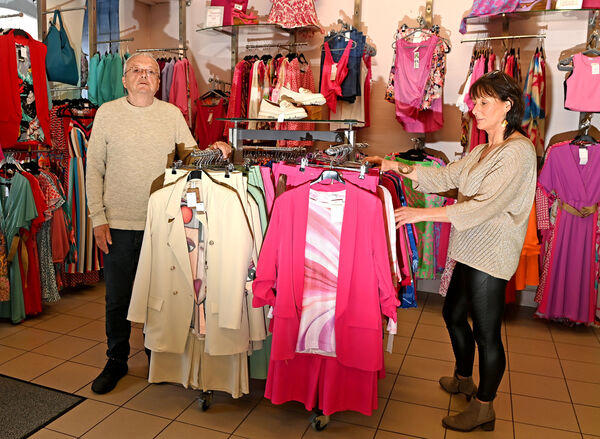

Couple locked out of their Clonmel store once locked in with a vulture fund
• 2h ago
On September 29 last, two employees of the Now clothes shop on Clonmel’s Gladstone Street turned up to open the premises.
When they arrived they found the locks had been broken and two individuals from a security firm were inside. They told the employees that they were there legally, having been dispatched by a receiver for the business. The employee immediately rang the owner of the shop, Tony Kenny.
He contacted the gardaí but found no resolution.
“The fellas came in and broke the locks and then they slept in the shop for two weeks,” Kenny said. “They were only doing what they were told under the impression it was all within the law.”
For the two weeks that followed, the shop was closed for business.
Kenny, who with his partner Joan McEneff had been operating retail fashion shops in the town for over 30 years, brought the issue to the High Court. Before the matter came to a full hearing, an agreement was reached. The shop could reopen but the receiver’s representatives would retain access. The security personnel would travel daily from Kilkenny and open the shop, and return each evening to close up.
“I’d often be hanging around in the evening waiting for them to turn up to close it,” Kenny says. “It wasn’t their fault, they were just doing what they were told. This went on until the middle of December.”
At that point, the receiver relented and Kenny and McEneff returned to control their outlet. The couple maintains the attempt to evict them was illegal and the matter in its entirety is due before the High Court. They are still running their business with the threat of eviction hanging over them.
Kenny and McEneff are typical of small businesses operating in the Irish economy that went through tough times but came out the other side. Despite weathering financial hardship they managed to maintain their business yet now find themselves at the mercy of a vulture fund. They didn’t do any business with the fund. They took out loans with one of the retail banks and were not consulted when their loans were sold to the fund. They weren’t even informed that it was happening.
Tony Kenny and Joan McEneff’s mortgages were sold on without their knowledge.© Provided by Irish Examiner
Tony Kenny and Joan McEneff’s mortgages were sold on without their knowledge.
Earlier this month, the highlighted the case of Tom and Dena O’Donovan in Clonakilty, whose family hotel is under threat from receivers following the sale of their bank loan to the same vulture fund that is pursuing Kenny and McEneff.
There are an estimated 60,000 borrowers whose loans are now with one of the funds, which were invited into the country to assist in cleaning up the banking sector in the wake of the financial crisis of 2008. For mortgage holders, interest rates can be legally ratcheted up by these funds on their loans, and for businesses, it can mean that viable entities are simply closed down in order to liquidate assets so the funds can reap a quick, and often lucrative, return on their purchase of the loans.
Basic elements of business are sundered in this dispensation. For instance, in provincial Ireland in particular, the local business has an ongoing relationship with their banker, typically one of the retail outlets such as AIB or Bank of Ireland. The personal touch ensures that any issues that arise can be dealt with face-to-face and resolved.
Yet now, those businesses whose loans have been sold to a vulture fund find that personal link is gone.
So it is with Kenny and McEneff. They are Dubliners who relocated to Clonmel in 1983 and opened their first shop, selling clothes and shoes.
“The 1980s were pretty awful economically in Dublin and we have connections here so we moved down. We rented a premises at first and lived over it,” Kenny recalls. “Then we bought it and managed to get another shop going. After that, we expanded further and opened another one in Thurles.”
They took out separate mortgages with AIB on all three shops. The couple settled in Clonmel, raising three children. When the financial crash came along they managed to weather it and come out the other side. Then, a few years later, problems began to surface in the most unlikely manner.
“The premises next door to our shop in Thurles ran into trouble,” Tony says. “They ended up in receivership and there were a number of disputes. Between one thing and another the building ended up being demolished. That’s when our problems started. The job that was done resulted in structural damage and we had leaks into our shop. In the end, around 2015, we had to shut down.
There was a lot of stress during that time and then we found ourselves with a bit of a financial hit.
The couple launched a High Court action for damages against the receiver for the property next door in Thurles. The wheels of justice turned slowly. The mortgages still had to be paid so they reached an agreement with the bank to resort to interest-only repayments.
They had sued for €800,000 but got a settlement of €350,000 in 2019. It was another few years before any of that money was sourced, and even then it was far short of the award. In the meantime, AIB sold on the mortgages associated with the business.
The sale of loans and mortgages by high street banks to vulture funds has become a contentious issue. These funds were first invited into the country in the wake of the financial crash with a view to cleaning up balance sheets in the banks. All of the banks were being weighed down with bad debts as a result of doling out excessive loans in the Celtic Tiger years. Apart from setting up Nama, the government saw the entry of the funds as a means to bring the banks back to full health.
The funds buy the loans at a discount – often a considerable one – allowing the banks to improve their financial ratios. An Oireachtas committee heard last month that the discount on these loans can be up to 50%. The funds then come to an arrangement with the borrowers on how repayment is to be made.
The strategy of cleaning up the balance sheets of the banks began well over a decade ago, yet the practice of selling loans to vulture funds persists, particularly with AIB, in which the state still has a majority shareholding. Every so often the bank does some form of a spring clean in which it sells off a bundle of “non-performing” loans to a fund. It is then up to the funds how to recover payment for the loan.
For instance, just last June, AIB sold a package of loans for €400m to Everyday Finance, the same fund that owns the loans of Kenny and McEneff. AIB chief executive Colin Hunt said, at the time, that the transaction reduced the bank’s NPE (non-performing exposure) ratio to below 5%.
“It demonstrates further progress as we move towards closing out legacy items this year while maintaining momentum in the delivery of our strategy,” he said.
A key aspect of this system is the definition of “non-performing”. Ostensibly, this refers to a loan that is not being serviced properly and regularly. The general view of the borrower in such a circumstance is that they had effectively given up the ghost on ever repaying, or had gone out of business, or were behind in payments and regarded as not capable of getting back on track.
The reality is different. The bank can classify as “non-performing” any loan in which the original contract was broken. This includes loans that ran into trouble but were restructured in which the borrower has since met all obligations on repayments. This was the scenario that applied to the O’Donovans’ family hotel in Clonakilty. They were meeting all repayments following an earlier restructuring, but the mere fact that the terms of their original loan had changed meant it could be classified as “non-performing” and sold on.
In the case of Tony Kenny and Joan McEneff, the fact that their mortgages had reverted to interest-only repayments meant that it could be classified as “non-performing” despite all repayments being made and the business continuing to be viable.
So, as the law stands, “non-performing” loans can be attractive to a fund if the term applies to a business that has some well-secured assets. Equally, in negotiating with banks to buy a package of loans, a fund will be eyeing those loans which are most likely to yield a quick, and sometimes lucrative, return. The other side of that coin is that businesses that are viable and have weathered previous storms could now, as their loans have been sold, face the very real prospect of being shut down and their premises seized.
In 2019, the couple became aware that their three mortgages had been sold to Everyday Finance. According to Tony Kenny, some months later, he discovered that after the first scheduled repayment he found that Everyday was no longer taking the monthly sums for two of the three mortgages.
“We appointed a few people to try and deal with them,” he said. “We got a financial advisor who was recommended to us, but they just didn’t seem interested.”
What became obvious early on was that Everyday had absolutely no interest in continuing with the existing terms of the loans into the future. Legally, Everyday appears to be on solid ground in this respect although the conditions in which these funds are allowed to operate have been criticised.
The Clonmel couple are trading under the threat of repossession despite offering to pay back their loans.© Provided by Irish Examiner
The Clonmel couple are trading under the threat of repossession despite offering to pay back their loans.
The couple made an offer to pay back fully but this was not accepted.
The response from the fund was that the offer did adequately address the outstanding loan balances.
The couple were informed it might now be necessary to appoint a receiver to sell properties on which the loan was secured.
Their business, and by extension their lives, have been in suspension since. The threat of their shop being literally sold from under them remains. Like others running small businesses around the country, they are finding that they are bearing the brunt of a policy that was initiated over a decade ago to clean up a financial mess.
We’ve worked hard all our lives. It was tough at times and we ended up in trouble that was not of our making. And now this is where we find ourselves. There is something just not right about the whole thing.
A series of questions about how Everyday Finance deals with clients and its processes were submitted to the company’s email address on April 24. As with previous inquiries, this one did not receive a response.
